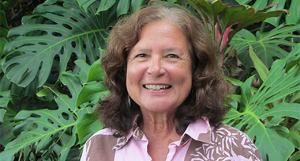Davianna Pōmaika'i McGregor named Center for Oral History Director
University of Hawaiʻi at MānoaDavianna Pōmaika'i McGregor, professor and founding member of the Ethnic Studies Department in the College of Social Sciences at the University of Hawai'i at Mānoa, has been named director for the Center for Oral History (COH). Established in 1976 by the Hawaiʻi State Legislature, the center produces oral histories and interpretive historical materials about lifeways, key historic events, social movements and Hawaii’s role in the globalizing world through the collection, documentation and preservation of the recollections of Native Hawaiians and the multi-ethnic peoples of Hawaiʻi.
“By documenting the life stories of Hawaii’s multi-ethnic kūpuna, the Center for Oral History provides a valuable resource that highlights the rich historic legacy of our multi-ethnic communities and contributes to a greater understanding, respect, appreciation and sense of identity among multi-generational and recently arrived members of our island society,” said McGregor.
Since its founding, the center has interviewed more than 800 men and women. These oral histories have been transcribed in 30,000 pages and are accessible through Hamilton Libraryʻs ScholarSpace, an open-access, digital institutional repository which stores the intellectual works and collections of the UH Mānoa academic community.
Future plans for COH include: conducting interviews with delegates of the 1978 Constitutional Convention; gathering oral histories of kūpuna who gather and protect limu/seaweed throughout the islands and belong to the Limu Hui, a network of traditional limu practitioners from throughout the state; developing a podcast series on KHPR that weaves together oral histories from the center’s collection; and documenting the photo archive of professional photographer Franco Salmoiraghi. UH Mānoa College of Social Sciences will also integrate oral history into its curriculum, research and service learning and provide training workshops for students, faculty and the community.
“I’m excited that Dr. McGregor is revitalizing the Center for Oral History through new educational programs, visiting scholars, and fresh vision," said Denise Eby Konan, dean of the College of Social Sciences. Her understanding of Hawaii’s peoples and communities will assure we are capturing significant and meaningful stories in perpetuity."
McGregor is a graduate of UH Mānoa, where she earned her bachelor’s degrees in Asian/Pacific History and Secondary Education, a master’s degree in Pacific Islands Studies, and doctorate in Hawaiian/Pacific History.
Her ongoing research, which includes oral history interviews, focuses on the persistence of traditional Hawaiian cultural customs, beliefs, and practices in rural Hawaiian communities on the main Hawaiian islands. This work is featured in her 2007 UH Press book, Kuaʻaina: Living Hawaiian Culture, which won the Kenneth W. Balridge Prize for best book in any field of history written by a resident of Hawaiʻi from 2005-2007.
She lives in Kaiwi'ula on the island of O'ahu and Ho'olehua on the island of Moloka'i. As a member of the Protect Kaho'olawe 'Ohana she helps provide stewardship of the island of Kanaloa Kaho’olawe.
MORE ABOUT THE DEPARTMENT OF ETHNIC STUDIES
The Department of Ethnic Studies in the UH Mānoa College of Social Sciences focuses on race and ethnicity in Hawai‘i, the United States, and the Pacific. Through engaged Oceanic learning and research, students develop theoretical, methodological, ethical, and participatory skills to analyze power relations and promote social justice in a globalized world. Established in 1970 to teach “Our History, Our Way”, the department maintains a research and teaching philosophy emphasizing praxis: the application of theory to complex problems in local communities, through service learning and civic engagement. Students develop the ability to think critically about society and popular culture, and work effectively within a global, multicultural community.
MORE ABOUT THE COLLEGE OF SOCIAL SCIENCES
Marked by leadership, excellence and innovation, the College of Social Sciences at the University of Hawai‘i at Mānoa provides students with a culturally diverse experience that transforms them into bold, engaged global citizens who affect change, break down barriers, touch lives and succeed in a multi-cultural context. Its student-centered environment is dedicated to providing students with a vibrant academic climate that affords exciting, intense interaction among students and faculty as they address fundamental questions about human behavior. Featuring outstanding scholarship through internships, active and service learning approaches to teaching, and an international focus particularly in the Asia Pacific region, it prepares students to become leaders in public and private enterprises throughout Hawai‘i and Asia.

